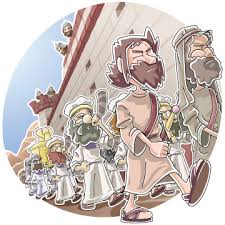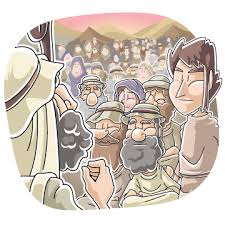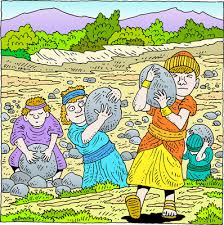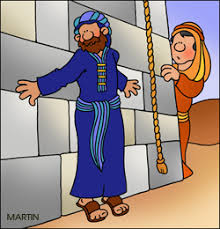Joshua 6:13-14 – And the seven priests bearing the seven trumpets of rams' horns before the ark of the Lord walked on, and they blew the trumpets continually. And the armed men were walking before them, and the rear guard was walking after the ark of the Lord, while the trumpets blew continually. And the second day they marched around the city once, and returned into the camp. So they did for six days.
As we return to our study, we find the Israelites beginning to engage Jericho in battle according to the specific instructions of the Lord. Prior to engaging the enemy, Israel had rededicated themselves to God by circumcising all the males and celebrating the Passover.

With Joshua leading them, they prepared to complete the exact battle plan given to them by the Lord. The conquest of the Promised Land had finally begun!
As they marched, the priests sounded the rams' horns. As we noted in our earlier studies, Israel normally used trumpets of silver to sound the alarm to go to war. Since rams' horns were normally sounded on the Day of Jubilee to proclaim a return of the land to its rightful owners, God may have appointed the rams' horns to be sounded in this instance to declare that the land now belonged to Israel.
In either case, we can be sure that the sound of the horns was an encouragement to the soldiers; it was a sign that God would remember them in the day of battle (Numbers 10:9).
Joshua 6:15 – On the seventh day they rose early, at the dawn of day, and marched around the city in the same manner seven times. It was only on that day that they marched around the city seven times.
Obviously, it was just as easy for God to collapse the walls of Jericho on the first day as it was the seventh day. We can conclude that there must be some reason why God made them wait.
It is certainly true that the waiting period gave Rahab time to gather her family together and get them safely to her house. It also played upon the fears of the people of Jericho and gave them one last chance to repent. But the real reason for the delay had nothing to do with the people of Jericho – it was a lesson for Israel.
By requiring Israel to march in a specific way for a specific number of days, God emphasizes the lesson of trusting in him, obedience to his commands and waiting patiently before him during times of war. Israel knew God was going to secure the victory in his own way; this proved he would do it in his own time frame as well.
It's important that we understand this lesson as well. When we stand upon a promise of God, we will face opposition from the enemy. We too must be willing and able to follow the voice/instructions of God and be disciplined enough to wait for his timing. If we can't do that, we will ultimately be unsuccessful.
Another thing that jumps out as we read this passage is that Israel marched around Jericho seven times on the seventh day. This means that one of the days was actually a Sabbath day on which they were forbidden to do any work.
If the Sabbath occurred on any of the days they marched around the city once, there was really no issue – they were only walking, not really working. Besides, the act of encompassing the city along with the priests and the ark could certainly be categorized as a religious observance.

However, the Sabbath could just as easily have fallen on the seventh day – the day Israel marched around Jericho seven times and then engaged in battle. In fact, Jewish tradition says this was the case, even though there is nothing to document that claim.
Critics of the bible are quick to insist that this passage shows God to be of a changeable (and thus untrustworthy) nature – he insists on keeping the Sabbath one day, while commanding it to be broken on another.
How foolish and hard of heart these critics are! For one thing, it is impossible to prove whether the seventh day was a Sabbath or not. Furthermore, even if it was, God is not bound by the Sabbath. He instituted it in the first place (Exodus 20:8) and as its creator/founder, he has the authority to suspend or even cancel this observance any time he wants to.
For instance, in the New Testament Jesus healed on the Sabbath. This made the Pharisees and other religious leaders furious; they maintained that Jesus had broken the Sabbath and thus he could not possibly be the Messiah.
Luke 13:14 – But the ruler of the synagogue, indignant because Jesus had healed on the Sabbath, said to the people, 'There are six days in which work ought to be done. Come on those days and be healed, and not on the Sabbath day.'
But Jesus pointed out that the Sabbath could not restrict or limit the work of God, because God was Lord or Master over it:
Matthew 12:8 – For the Son of Man is Lord of the Sabbath.
Therefore, God had every right to command Israel to fight on the Sabbath. This in no way indicates that God has a character flaw!
Joshua 6:16 –And at the seventh time, when the priests had blown the trumpets, Joshua said to the people, "Shout, for the Lord has given you the city."
There can be no doubt that the shout of the children of Israel was a shout of faith.
Israel marched around Jericho for six consecutive days, even though it seemed to have no effect upon the walls of the city. They probably endured insults and trash talk from the people of Jericho as they did so. If they didn't have faith in God, they would not have done this day after day.
Hebrews 11:30 – By faith the walls of Jericho fell down after they had been encircled for seven days.
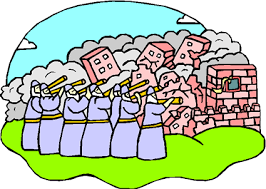
Even on the seventh day, when they made seven laps, nothing occurred until they gave that shout of faith. But once they did, the walls immediately collapsed! That shout was a shot of faith and prayer that instantly ascended to the throne of God who had been watching over Israel this entire time! Essentially, that shout signaled the complete and utter ruin of the kingdom of Jericho.
It is refreshing to remember that at the end of this age when Jesus comes to claim his church, he comes with the same two things –a shout and the sound of a trumpet (I Thessalonians 4:16). When he does, it signals victory for us and the utter defeat of the kingdom of darkness!
Joshua 6:17 – "And the city and all that is within it shall be devoted to the Lord for destruction. Only Rahab the prostitute and all who are with her in her house shall live, because she hid the messengers whom we sent."
Later on, when Israel conquered other cities, they were able to keep the livestock and property for themselves. In fact, scripture says that God gave them entire cities and their contents:
Deuteronomy 6:10-11 - And when the Lord your God brings you into the land that he swore to your fathers, to Abraham, to Isaac, and to Jacob, to give you – with great and good cities that you did not build, and houses full of all good things that you did not fill, and cisterns that you did not dig, and vineyards and olive trees that you did not plant.
However, Jericho, the very first Canaanite city that was captured, was dedicated to God as a 'first-fruit' offering. What was a first-fruit?
Basically, it's the first of any increase including crops (grain, fruit, etc), livestock and the first-born male in each family (Exodus 22:29-30). The first-fruits of the crops and livestock were brought to the temple and given to the priests. The crops were dedicated to the Lord by 'waving' them, while the livestock was sacrificed on the altar.
All first-born males were redeemed by sacrificing a substitute animal (Exodus 34:20). The items brought to the temple were then used to provide for the needs of the priests and their families.
The first-fruits were an acknowledgement that God was the one who had provided all of the increase to the children of Israel.
Thus Jericho, as the first city to be taken in the Promised Land, was a kind of first-fruit. It was a token that Israel was going to receive all of the Promised Land from God. Therefore, everything in the city was devoted to God – every living thing (except Rahab and her family) was put to death, all precious metals were brought into the treasury of the tabernacle and everything else was destroyed and/or burned with fire.
Joshua 6:18 – "But you, keep yourselves from the things devoted to destruction, lest when you have devoted them you take any of the devoted things and make the camp of Israel a thing for destruction and bring trouble upon it."
As we just mentioned, the men of Israel were at liberty to take spoil from the cities of Canaan when they conquered them (Deuteronomy 2:35, 3:7, Joshua 8:27, etc). However, in the case of Jericho, the city was a 'first-fruit' and as such everything in it belonged to God.
Because the soldiers might be tempted to take some of the riches of the city for themselves, God gives them a final caution/warning just before the battle commenced: They were, without exception, forbidden to take ANYTHING from the city. Period.
Everything in Jericho was under a curse of destruction. If a soldier took something from the city, it would result in severe consequences. He himself would be cursed and worse yet, he would bring adversity upon the entire nation of Israel. This verse foreshadows the events of chapter seven (the story of Achan).
Joshua 6:19 – "But all silver and gold, and every vessel of bronze and iron, are holy to the Lord; they shall go into the treasury of the Lord."
Since metals could not be destroyed by fire, they were removed from common use by being taken into the temple treasury to provide for the needs of the sanctuary. They were probably purified first, by being passed through fire like the metals taken in the defeat of Midian under Moses (Numbers 31:21-23).
Joshua 6:20 – So the people shouted, and the trumpets were blown. As soon as the people heard the sound of the trumpet, the people shouted a great shout, and the wall fell down flat, so that the people went up into the city, every man straight before him, and they captured the city.
Here we see the faithfulness of God at work: Israel has obeyed his word and acted in faith. They silently marched around the city for an entire week, unaffected by the taunts of the enemy or the overwhelming circumstances they faced. At the proper time, in accordance with the command of Joshua, they gave a great shout of faith.
In return, God does exactly as he promised he would. He rewarded Israel for her obedience and her labor by supernaturally bringing down the fortified walls of Jericho (Isaiah 45:2).

There is some question as to whether all the walls fell at once. The question is raised when we discover that Rahab's house was not destroyed. So, either the section of the wall that contained her home was the only one standing, or it fell after she and her family were rescued. In either case, we see the hand of God at work.
As for the people of Jericho, it is very likely that multitudes of soldiers and even civilians were gathered on the walls to try and catch a glimpse of the Israelites and/or to try and intimidate them through mocking. This multitude was killed and/or buried in the rubble of the falling wall. The man-made structure that they trusted in as their defense was unable to save them; it became the instrument of their demise.
The sinners of our generation are often just as foolish. Those without Christ must place their faith in something, and they frequently choose the institutions of mankind such as government, science, the economy or the military.
For those who reject Christ, these defenses are just as futile as the walls of Jericho. The only hope for the Canaanites was to repent and turn to the living God. The same is true for sinners today. The good news is that God desires for every person to repent and he gives us multiple chances to do so.
II Peter 3:9 – The Lord is not slow to fulfill his promise as some count slowness, but is patient toward you, not wishing that any should perish, but that all should reach repentance.
However, God will not force himself upon anyone. The sinners of today have the same choice as the sinners of Canaan, and if they refuse to repent, they too will face the judgment of God.
Joshua 6:21 – Then they devoted all in the city to destruction, both men and women, young and old, oxen, sheep, and donkeys, with the edge of the sword.
Had Israel acted out of their own sense of cruelty, hatred or lust we would certainly condemn their actions. However, this was not the case. The Lord himself, the creator and righteous judge of all the earth, ordered the death of everything in Jericho that breathed.
Psalms 98:9 – before the Lord; for he cometh to judge the earth: with righteousness shall he judge the world, and the people with equity.
As humans, we have no right to question or second guess the decision of God who purged the land of Canaan in this manner.
What we can do is be thankful that we live in the age of grace where God's mercy is always available to the sinner. We can share the gospel message with the lost in our generation, trusting that it will take root in their hearts and bring about a harvest of repentance and eternal life.
Joshua 6:22-23 – But to the two men who had spied out the land, Joshua said, "Go into the prostitute's house and bring out from there the woman and all who belong to her, as you swore to her."So the young men who had been spies went in and brought out Rahab and her father and mother and brothers and all who belonged to her. And they brought all her relatives and put them outside the camp of Israel.
For his part, Joshua keeps his promise to spare Rahab and her family (Hebrews 11:31).

The same men whom she previously protected were sent to protect/rescue both she and her family. This makes sense because they were the only men who knew what Rahab looked like; they were the only Israelites she would trust. Besides, it would have been virtually impossible for any other soldier to find/recognize the scarlet cord that hung in her window, especially in the midst of the chaos present during the destruction of the city.
Did you notice that God not only spares Rahab but her family as well? This is something God consistently does throughout scripture:
- Noah's wife, sons and daughters-in-law were all saved from the flood (Genesis 7:1).
- The Philippian jailer came to salvation through Paul and Silas, as did his entire house (Acts 16:31-33).
- The nobleman and his entire house believed in Christ when his son was healed (John 4:53).
God is so merciful!
Interestingly, the soldiers did not take Rahab and her family directly into the camp of Israel. The camp was considered holy and nothing unclean could be admitted into it, including Gentiles from a pagan nation.
However, after the proper religious observances and commitments (including circumcision for the males), Rahab and her family were admitted into Israel as proselytes of the Jewish faith. Eventually, Rahab becomes the wife of Salmon and the mother of Boaz which means she was in the lineage of Christ (Matthew 1:5)!
This is another wonderful Old Testament example of God accepting Gentiles into his kingdom. It was a foreshadowing of the gospel dispensation when God welcomed all Gentiles into faith in Christ.
Specifically, it reminds us of the way Jesus had mercy on the publicans, harlots and sinners he came into contact with as he walked the earth; all who repented were welcomed into his kingdom (Matthew 21:31-32).
Joshua 6:24-25 – And they burned the city with fire, and everything in it. Only the silver and gold, the vessels of bronze and of iron, they put into the treasury of the house of the Lord. But Rahab the prostitute and her father's household and all who belonged to her, Joshua saved alive. And she has lived in Israel to this day, because she hid the messengers whom Joshua sent to spy out Jericho.
The phrase 'she has lived in Israel to this day' does not necessarily mean that the book of Joshua was penned during Rahab's lifetime. Most likely it refers to the fact that her posterity became a part of the nation of Israel. Again, this is significant because it shows that a Gentile believer was admitted into (and became a part of) God's chosen people.
Joshua 6:26 –Joshua laid an oath on them at that time, saying, "Cursed before the Lord be the man who rises up and rebuilds this city, Jericho. At the cost of his firstborn shall he lay its foundation, and at the cost of his youngest son shall he set up its gates."
Jericho was surrounded by palm trees. It had fertile land and access to water from the Jordan river. It was no doubt a very pleasant and favorable place for a city. For these reasons, people would be tempted to rebuild the city on its former site as a good place for them and their descendants to live.

However, the scripture is very clear that anyone who rebuilt this city would have no descendants left to live in it.
Those who attempted to rebuild Jericho would find their first-born son dead as they set the foundations. If they persisted in their endeavor, their youngest son would die as the city was finished (the gates set in place). The implication is that any children born in between would also perish.
Sadly, during the era of the kings, this is exactly what happened:
I Kings 16:34 – In Ahab's time, Hiel of Bethel rebuilt Jericho. He laid its foundations at the cost of his first-born son Abiram, and he set up its gates at the cost of his youngest son Segub, in accordance with the word of the Lord spoken by Joshua son of Nun.
Why didn't God want the city rebuilt?
- God wanted these ruins to remain as a perpetual monument of his wrath against the Canaanites when their iniquity was full. It was a warning to all kingdoms and societies who reject the laws of God.
- The desolation of Jericho was also a witness of God's mercy and favor toward his people, which was to remain for later generations to see and understand.
- Of course, we can't deny that it was a warning of the severe penalty that would fall upon anyone who put themselves under a divine curse, which would surely bring ruin without any avenue of escape.
Yet, it appears as though the curse fell only upon the builder of the city, not on those who eventually inhabited it. In later times we find Elijah, Elisha and even Jesus himself visiting this city (Matthew 20:29, Luke 18:35).
Joshua 6:27 – So the Lord was with Joshua, and his fame was in all the land.
Back in Joshua 1:7, we saw that the Israelites pledged their loyalty to Joshua on the condition that God would be with him.
Now we find that the conquest of Jericho firmly established Joshua as the leader of the nation. This marks the climax of his rise to leadership, fulfilling God's promise to him in Joshua 1:5.
Let me offer you some encouragement:
Rahab made a conscious decision to abandon her pagan ways and place her trust in the true God of Israel. This was her first step in obtaining mercy and deliverance. What about you? Is it possible that you are reading this post today, but you have never surrendered your heart and life to Jesus Christ?
If that is the case, I strongly encourage you to make peace with God today. You can do so by praying the following prayer, and meaning it from your heart:
Jesus,
I confess to you that I am a sinner. I am sorry for all the wrong things I have done and I ask you to forgive me. I believe that you are the Son of God, that you died on the cross and rose again, and that your blood paid the price for my sin. I invite you to come into my heart and life and to be my Lord and Savior. I commit myself to you right now. Thank you for saving me from death and giving me the gift of eternal life. Amen.
If you prayed this prayer and sincerely meant it, then you have received the gift of salvation from Jesus Christ!
Let me offer you some relief:
The topic of faith is central to our study today. The Israelites placed their faith in God and waited for their victory to manifest itself.
If you feel that your faith is weak or inadequate, let me give you some relief – faith is not static. All of us begin with a measure of faith, but if you exercise or use it (as the Israelites did), it will strengthen and grow just like your muscles do when you work out.
As I have pointed out before, you can begin exercising faith today – seek God about a situation in your life that needs his touch. Find scriptures that promise victory and speak them over the situation. Follow any instructions Holy Spirit speaks to you and watch for your victory to manifest itself.
Let me offer you some strength:
God remembered and strengthened Israel in the day of battle against her enemies. Likewise, God still remembers and strengthens his people (the church) in our day of battle too.
God has a plan to save our nation. He has revealed the practical steps for the war to many of the national prophets. As we pray, intercede and follow his directions, he will fight on our behalf just as he fought for Israel.
Don't be afraid to join the battle. In fact, I encourage you to begin listening to the prophetic leaders in America and to get involved. God has promised that the church will be victorious against the enemy, but we must participate with him in the victory just as Israel did.
Your capabilities may seem limited, and the enemy may look formidable, but don't worry – Israel was victorious in the exact same situation, because God was on her side!
So don't look at the circumstances. Strengthen 'feeble hands and weak knees' by keeping your mind and faith fixed on the power of God, which cannot be defeated in any circumstance (Isaiah 35:3).



